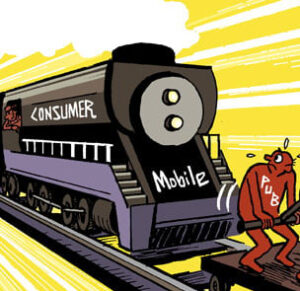Short Attention Span Theater
Marketers are obsessed with TV’s “big screen” experience. But YouTube’s strategy marries the “big and little screen,” reports Marketing Brew.
The Google-owned video platform has been steadily growing its position across linear TV, streaming and short-form social video. Basically, YouTube is leaning into viewers’ shorter-than-ever attention spans – and their growing tendency to fiddle on phones while watching TV – to maximize revenue.
The gambit is paying off. YouTube has been the No. 1 streaming service for the past two years, according to MarketWatch, prompting YouTube CEO Neal Mohan to recently dub the platform as “the new television.”
But at the same time it tackles the big screen, YouTube has been following TikTok’s short-form video trend with its own offering, YouTube Shorts. YouTube has also become a go-to destination for podcasting, now amassing over a billion monthly listeners (or viewers, actually).
This multiformat, every-screen strategy means YouTube reaches consumers across several touch points. But the breadth of the YouTube model presents challenges both for content creators and monetization.
Short-form YouTube content doesn’t monetize as well as long-form, although both formats are essential for community building. And revenue doesn’t always offset production costs, for publishers and advertisers alike.
Big Problems
Anyone with a brain (and even those without) can see where generative AI is headed.
“If a generative AI system like ChatGPT is also an ad platform, its primary job becomes not helping you, but monetizing you.”
That’s via … ChatGPT, when prompted by Joe Marchese to consider the consumer repercussions if the self-same platform were to incorporate ads, for a guest column at the newsletter Big Technology.
“Poor advertising experiences can kill entire mediums. Just look at cable TV,” writes Marchese [who sold his interactive TV advertising startup True[x] to Fox]. “It’s not the content, or the bundle that bothers most people (I’ll happily debate this with anyone), it is the viewer’s experience.”
But the switch to generative AI search is far more difficult. Google could proffer a handful of options, organic and paid, for, say, a search for healthy nearby restaurants. An LLM or some AI-based assistant answering a request for “a healthy place on the way home” has fewer ways to easily offer options or to disclose how marketing budgets affected the decisions, at least in its current iteration.
Get The Ball Rolling
Sports marketing is going for the gold.
As media grows more and more fragmented, marketers are turning to live sports as one of the best ways to reach mass audiences. Within those larger sports followings, they’re finding ways to target niche audiences that are otherwise hard to reach.
Culturally relevant advertising is crucial to reach niche communities, James Kirkham, head of brand at soccer-themed messaging app Cleats Club, tells Digiday. That’s where the “true authenticity” lies.
Apparel brand American Eagle, for example, was having trouble reaching young men via paid media. The gamer-with-an-ad-blocker demo, if you will. American Eagle ended up sponsoring the social video series Drafted, which profiled up-and-coming NFL players during the draft.
Food delivery brand Just Eat took a similar approach, partnering with Cleats Club to provide special offers to 12,000 of what Kirkham calls “super fans” – a much more manageable group than trying to reach every soccer fan in a city.
Brands are better off “paying for involvement,” says Kirkham, rather than the current standard of “paying for eyeballs.”
But Wait! There’s More
How Amazon is selling its DSP this year. [Digiday]
A federal appeals court has temporarily paused the US Court of International Trade’s ruling that struck down most of President Trump’s tariffs. [CNBC]
Germany considers a 10% tax on Google’s and Meta’s ad revenue. [FT]
Palantir is implementing the Trump administration’s plan for the federal government to share data across agencies, consolidating detailed profiles on US citizens. [NYT]
Texas Governor Greg Abbott signed a law requiring Google and Apple to verify the ages of app store users. [CNN]
People vs. Algorithms: Understanding a post-search Google. [blog]
How Facebook lost its groove with audiences. And how it plans to get it back before brands move to other platforms. [Marketing Brew]
You’re Hired!
Contextual advertising company Seedtag promotes Brian Danzis to chief revenue officer. [release]
Thanks for reading AdExchanger’s daily news round-up… Want it by email? Sign up here.













